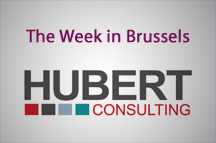 Brussels is finding its cruising speed again after the Christmas break. This week the priorities of Latvia’s EU Council Presidency were outlined to the various parliamentary committees by respective Latvian ministers. It was the opportunity for MEPs to discuss the priorities which were formally presented to them last week in Strasbourg.
Brussels is finding its cruising speed again after the Christmas break. This week the priorities of Latvia’s EU Council Presidency were outlined to the various parliamentary committees by respective Latvian ministers. It was the opportunity for MEPs to discuss the priorities which were formally presented to them last week in Strasbourg.
A number of new initiatives have been passed this week which may be seen as responding to citizen’s demands. The ENVI committee adopted a resolution calling for country of origin labelling of meat in processed foods. They called on the European Commission, which published a report on the issue in late 2013, to come up with legislative proposals in order to rebuild consumer confidence in the wake of the horse meat scandal and other food fraud cases. This comes one week after MEPs backed new legislation to allow EU member states to restrict or ban the cultivation of crops containing genetically modified organisms (GMOs) on their own territory.
 On Wednesday we learnt of the passing of Leon Brittan, former European Commissioner for competition, trade and external affairs. His influence over EU politics was highlighted in a statement by EU Commission President Jean-Claude Juncker who noted that he “will miss the man who made an important contribution to making the EU what it is today”.
On Wednesday we learnt of the passing of Leon Brittan, former European Commissioner for competition, trade and external affairs. His influence over EU politics was highlighted in a statement by EU Commission President Jean-Claude Juncker who noted that he “will miss the man who made an important contribution to making the EU what it is today”.
In what came as a provocative move for the Parliament and national environment ministers, the Commission decided to scrap the Circular Economy package. The package of six different bills which was developed under the Barroso Commission was intended to increase recycling levels and tighten rules on incineration and landfill. The Commission intends to re-table the package in the next few months and promises that it will be more ambitious. This is a very bold move from the Juncker Commission which is currently culling pending legislation as part of a drive to cut red tape.
 The big news on Thursday though was Mario Draghi’s quantitative easing announcement. The European Central Bank (ECB) launched a government bond-buying programme which will pump hundreds of billions of new money into the eurozone economy. The ECB will buy government bonds from this March until the end of September 2016. The new quantitative easing programme will pump €60 billion a month into the economy, meaning a total of more than €1 trillion will have been created by the end of the programme. This came at an important moment, three days before the Greek general elections which Syriza, the left-wing opposition party, may win. The party has run on a pledge to end austerity policies and to renegotiate the country's debt; a pledge which some see as having the potential to result in a Grexit.
The big news on Thursday though was Mario Draghi’s quantitative easing announcement. The European Central Bank (ECB) launched a government bond-buying programme which will pump hundreds of billions of new money into the eurozone economy. The ECB will buy government bonds from this March until the end of September 2016. The new quantitative easing programme will pump €60 billion a month into the economy, meaning a total of more than €1 trillion will have been created by the end of the programme. This came at an important moment, three days before the Greek general elections which Syriza, the left-wing opposition party, may win. The party has run on a pledge to end austerity policies and to renegotiate the country's debt; a pledge which some see as having the potential to result in a Grexit.
All eyes will be on Greece this Sunday as voters head to the polling stations. The results of this election could potentially have a big impact on EU politics and will surely lead next week’s headlines.
Hubert Consulting publishes a weekly EU Health newsletter. 150+ leading EU healthcare policy professionals have already signed up to it. If you are interested you can sign up here.














